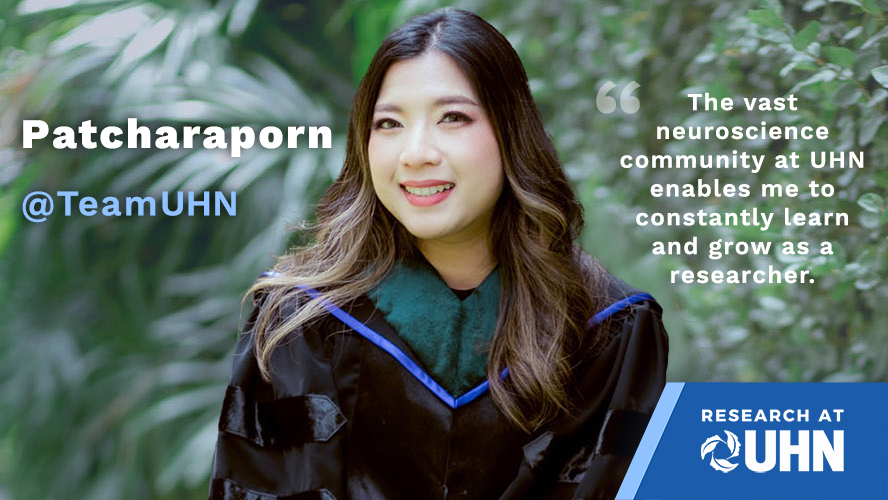
Tell us about your role at UHN.
I am a postdoctoral researcher in Dr. Mojgan Hodaie's lab at UHN’s Krembil Research Institute as well as a recipient of the Krembil Postdoctoral & Clinical Research Fellowship Award. I am also a member of the UHN Postdoc Association (UHNPA) Leadership Committee and the UHN Inclusion, Diversity, Equity, and Accessibility (IDEA) Research Committee where we strive to create an interactive and inclusive society for everyone at UHN.
How long have you been at UHN and what were you working on prior to this role?
I am now in my third year. Prior to starting my postdoctoral studies, I embarked on my Ph.D. in Anatomy at Chiang Mai University in Thailand where I worked on optimizing a research platform and protocols for neurodegenerative disorders. I also had the opportunity to complete a portion of my Ph.D. training at Baycrest Health Centre studying brain structure during the ageing process.
What are you working on at UHN?
I am currently studying the link between structural alterations in the brain’s limbic system and cognitive functioning in chronic neuropathic pain. For this research, I primarily utilize neuroimaging techniques such as magnetic resonance imaging (MRI). I am also involved in writing research grants, ethics proposals and clinical study design.
What are you passionate about in your role at UHN?
I have always had a passion for gaining knowledge in advanced multimodal neuroimaging techniques as well as contributing my expertise in neuroanatomy and cognitive neuroscience knowledge to the UHN research community. At UHN, I am constantly learning and growing, and have had the opportunity to collaborate with renowned researchers, lead research projects, manage budgets and advise and mentor new students.
I am also proud of my role with the UHNPA and IDEA Research committee where I am able to promote scientific workshops, educational outreach and career development opportunities to postdoctoral researchers as well as help towards creating a positive and inclusive workplace for everyone.
What does health research mean to you?
I see health research as an opportunity to improve people's health and enhance care and treatment worldwide at all levels, regardless of age, sexual orientation, gender identity and expression, race, ethnicity, religion, disability or economic status.
How does your work help to advance UHN's vision of A Healthier World?
My work aims to help patients who are suffering from neurodegenerative disorders have a better quality of life. By uncovering structural brain abnormalities and how they relate to cognitive functioning in aging and chronic pain populations, we can learn more about how to detect and treat conditions such as trigeminal neuralgia properly and effectively.
In addition, as a Thai national, this fellowship will give me the opportunity to extend my research skills and expertise to young trainees in Thailand and other research communities in Southeast Asia. I will be able to help establish a collaboration between research communities in Southeast Asia and North America. This is a mandate that I know is important for UHN, as global initiatives form one of its cross-divisional priorities.
What makes UHN an ideal place to advance health research?
Working at UHN enables me to actively engage with Toronto’s large brain science community that has one of the highest densities of neuroscientists in North America. This makes UHN an ideal place to not only advance health research, but also my research career. It is a distinct privilege to be a part of UHN and I hope to be able to contribute to the improvement of patients’ health in the communities we serve both locally and globally.
Do you have any interests outside of work?
I am a mom to two cats and a coffee lover. I also love to clean and cook as a way to relieve stress.
What do you see for the future of health research, and what gets you excited about it?
I see that open science will be fostered, and innovation and patient engagement will flourish and help to improve global health problems – that is very exciting!
It is also my hope that all of the work we are doing to create positive and safe workspaces and research environments will pay off and that there will be equal value placed on everyone’s contributions.
How to Participate in You @TeamUHN
You @TeamUHN is a campaign to highlight the important scientific contributions that research lab staff, trainees and learners, administrative staff, core facilities staff, Research Solutions & Services staff, and volunteers make towards A Healthier World through discovery and innovation. If you’re interested in sharing your story, we invite you to complete this form here (UHN Office365 account is required; open to UHN staff, trainees and volunteers).

